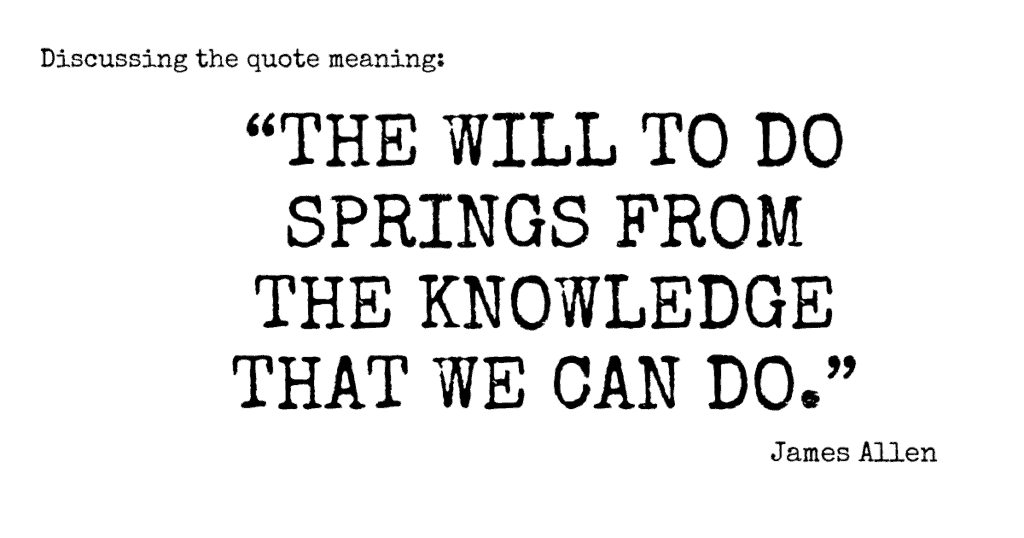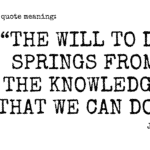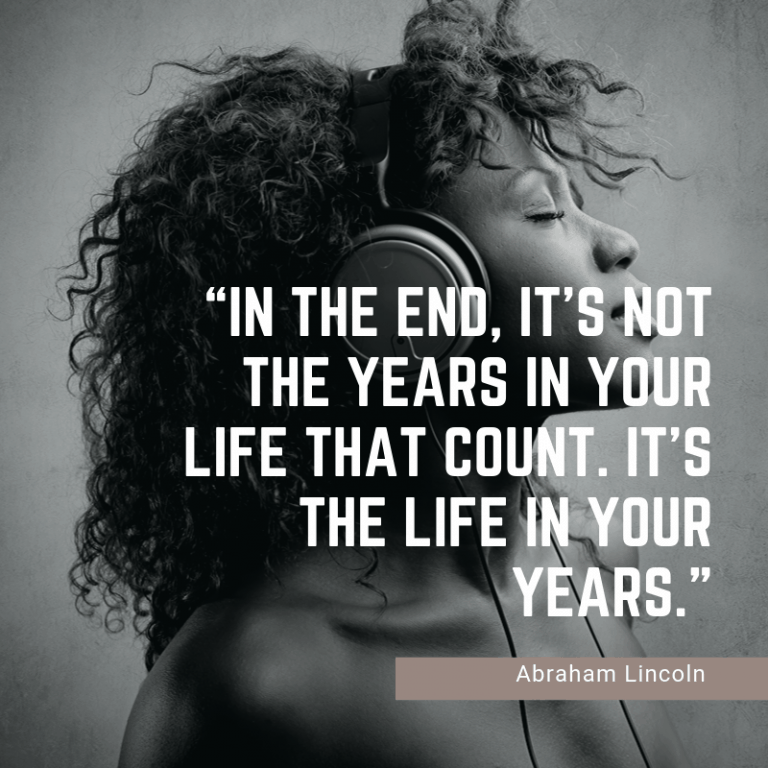The Will To Do Springs From The Knowledge That We Can Do – James Allen Quote Meaning
The will to do springs from the knowledge that we can do.
james allen

The James Allen quote “The will to do springs from the knowledge that we can do” suggests that our motivation, or desire to take action, is often fueled by the belief in our own capabilities. When we know or believe that we are capable of accomplishing something, we are more likely to be motivated to actually do it.
This belief in our abilities can energize us, and give us the confidence needed to initiate and persist in our actions. It highlights the importance of self-confidence and self-efficacy in driving our actions and efforts towards achieving our big goals.
So how do we get ourselves to ‘know’? First let’s look at the origin of the quote, supporting science beyond the theory and then consider some ways to booster our own belief in our real, everyday lives.
The Origin: James Allen’s World
James Allen, an inspiring figure from the British philosophical and self-help movement of the late 19th and early 20th centuries, is the mastermind behind this powerful statement. Known for his classic work, “As a Man Thinketh,” Allen explores the interconnection between our thoughts and our reality.

Quote Meaning
At its core, this quote is a rallying cry for the incredible power of self-belief. It suggests that the very fuel for our actions—our will to do something—ignites from the spark of knowing we have the capability to achieve it. It’s about recognizing our potential and allowing that awareness to drive us forward.
How Can It Help You?
Now, let’s get personal. How does this apply to you? Imagine the boundless energy you can unleash when you truly believe in your abilities. This isn’t just feel-good fluff; it’s backed by science.
Research in psychology, particularly in self-efficacy theory, highlights that belief in our own capability significantly impacts motivation, perseverance, and ultimately, success.
When you believe you can, you’re setting the stage for incredible achievements.
Psychological Applications
There are several psychological theories and bodies of research that support the idea that the belief in our own abilities plays a crucial role in motivating us to take action:
- Self-Efficacy Theory: Albert Bandura’s theory of self-efficacy, showed that an individuals’ beliefs in their ability to perform a task (self-efficacy) can significantly influence their actions. Higher levels of self-efficacy lead to greater confidence in facing challenges, more persistent effort, and better performance in various domains, from academics and sports to health behaviors and beyond.
- Goal-Setting Theory: This theory, mainly developed by Edwin Locke and Gary Latham, suggests that setting specific and challenging goals can lead to higher performance, provided that the individual is committed to the goal, has sufficient ability, and receives task-relevant feedback. The belief in achievement of the goal (which ties back to self-efficacy) is crucial for the motivational impact of goal-setting.
- Achievement Motivation Theory: Developed by David McClelland, this theory focuses on the need for achievement as a key driver of motivated behavior. People with a high need for achievement tend to believe more in their capabilities, seek out challenging tasks, and persist longer in the face of obstacles.
- Expectancy Theory: Victor Vroom’s Expectancy Theory in organizational psychology emphasizes the role of individual expectations in motivation. According to this theory, motivation is influenced by the expectancy (belief that effort will lead to desired performance), instrumentality (belief that performance will lead to rewards), and valence (value of the rewards) associated with an action. The initial step, expectancy, is closely related to the individual’s belief in their ability to perform the task.
Actionable Steps for Real Life
Not just inspiring words, let’s look into how we can apply this to our own lives, and convince ourselves that we can do something.
Here are some actionable steps:
- Reflect and Recognize: Take some time to really reflect on your past successes, no matter how small. Like an achievement list, this process reminds us of our capabilities in the past, and therefore the ability to repeat this again.
- Set Achievable Goals: Start with small, manageable goals that you know you can achieve. Each success will build your confidence and reinforce the ‘knowledge that you can.’
- Affirmations: Incorporate positive affirmations into your daily routine. Statements like “I have the skills and knowledge to succeed” can bolster your belief in your abilities over time.
- Seek Knowledge: Continuously seek out new knowledge and new skills in areas you want to learn and improve on. This enhances our self-efficacy, further powering our will to act.
- Surround Yourself with Believers: There is a ‘lid for every pot’. Find your people. Your community of like-minded people. Engage with a community that has achieved what you want to, that believes in possibilities and big dreams. Their support (and sometimes even knowing they exist) can amplify your own beliefs in what you can achieve personally.
Ultimately, the idea that believing in our ability to succeed at a task can significantly enhance our motivation to undertake and persist in that task can be seen in our everyday lives. Use this quote to remind and inspire you to keep believing and supporting the idea that you can achieve your goals.






